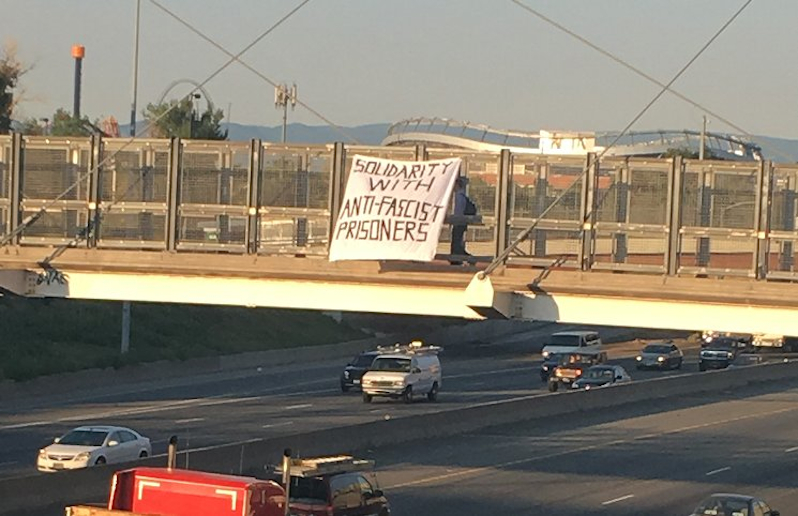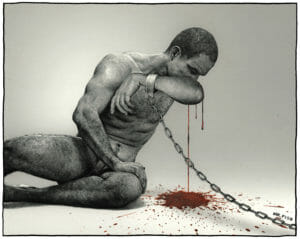Prisoners Gear Up for Mass Strike to Protest State-Sponsored ‘Slavery,’ Racism
The national and international action is scheduled to begin Friday—the 45th anniversary of the infamous Attica prison uprising. A banner over a Denver freeway supports the prison strike. (It's Going Down / Twitter)
A banner over a Denver freeway supports the prison strike. (It's Going Down / Twitter)
A banner over a Denver freeway supports the prison strike. (It’s Going Down / Twitter)
On Sept. 9, 1971, prisoners staged a takeover of Attica State Penitentiary, New York state’s most notorious prison. On Friday, the 45th anniversary of the uprising, many prisoners and prison workers in the U.S. and around the world are set to hold what organizers call an unprecedented strike.
The Incarcerated Workers Organizing Committee (IWOC), a standing committee of the Industrial Workers of the World, is joining with the Free Alabama Movement, Free Ohio Movement and a variety of other grass-roots coalitions to demand changes in the prison system. In a press release, the IWOC cites “prison slavery, working conditions and other grievances” as the reason for “a prison action unlike any ever seen in history.”
According to the release:
Prisoners will withhold their labor from the jobs they perform that keep prisons functioning, such as laundry, janitorial, clerical, food preparation, plumbing, maintenance, grounds keeping and electrical work, as well as manufacturing and agricultural jobs prisoners are forced to perform for corporate profit. Many prisoners will also be continuing hunger strike action and engaging in other forms of resistance.
Supporters of the striking prisoners have planned nearly 50 actions across the United States and abroad. From protesting at jails, prisons and immigrant and juvenile detention centers to agitating directly at the corporations that exploit prisoner labor, the working class will be taking to the streets in solidarity with striking incarcerated workers.
The participating organizations recognize a historical factor partially responsible for today’s toxic prison system. “[T]he 13th Amendment did not abolish slavery, but merely shifted ownership of slaves to the state,” the press release declares. As Truthdig has previously noted, the 13th Amendment “maintains a legal exception for continued slavery in prisons” by stating that “neither slavery nor involuntary servitude, except as a punishment for crime whereof the party shall have been duly convicted, shall exist within the United States.”
The IWOC release acknowledges that “demands vary from unit to unit and state to state,” but overall, “prisoners are coming together to end forced prison labor, receive access to quality medical care, end long-term solitary confinement and to stand against state sponsored racism in the form of prison segregation and its racist, sexist, and homophobic influences in our communities.”
There is a clear racial disparity among the 2.2 million prisoners currently locked up in America. The Sentencing Project, a nonprofit organization dedicated to creating “a fair and effective U.S. criminal justice system,” writes:
Today, people of color make up 37% of the U.S. population but 67% of the prison population. Overall, African Americans are more likely than white Americans to be arrested; once arrested, they are more likely to be convicted; and once convicted, they are more likely to face stiff sentences. Black men are six times as likely to be incarcerated as white men and Hispanic men are more than twice as likely to be incarcerated as non-Hispanic white men.
Dozens of organizations, including unions and news outlets, have publicly endorsed the upcoming strikes. In anticipation of the Sept. 9 day of action, smaller movements have emerged in recent months. Throughout July, there were hunger strikes at several prisons across the U.S. In August, prison rebellions and riots occurred in multiple locations. Additional actions (in the form of graffiti, banner drops and noise demonstrations) in support of prison strikes have occurred around the nation.
—Posted by Emma Niles
Your support matters…Independent journalism is under threat and overshadowed by heavily funded mainstream media.
You can help level the playing field. Become a member.
Your tax-deductible contribution keeps us digging beneath the headlines to give you thought-provoking, investigative reporting and analysis that unearths what's really happening- without compromise.
Give today to support our courageous, independent journalists.





You need to be a supporter to comment.
There are currently no responses to this article.
Be the first to respond.